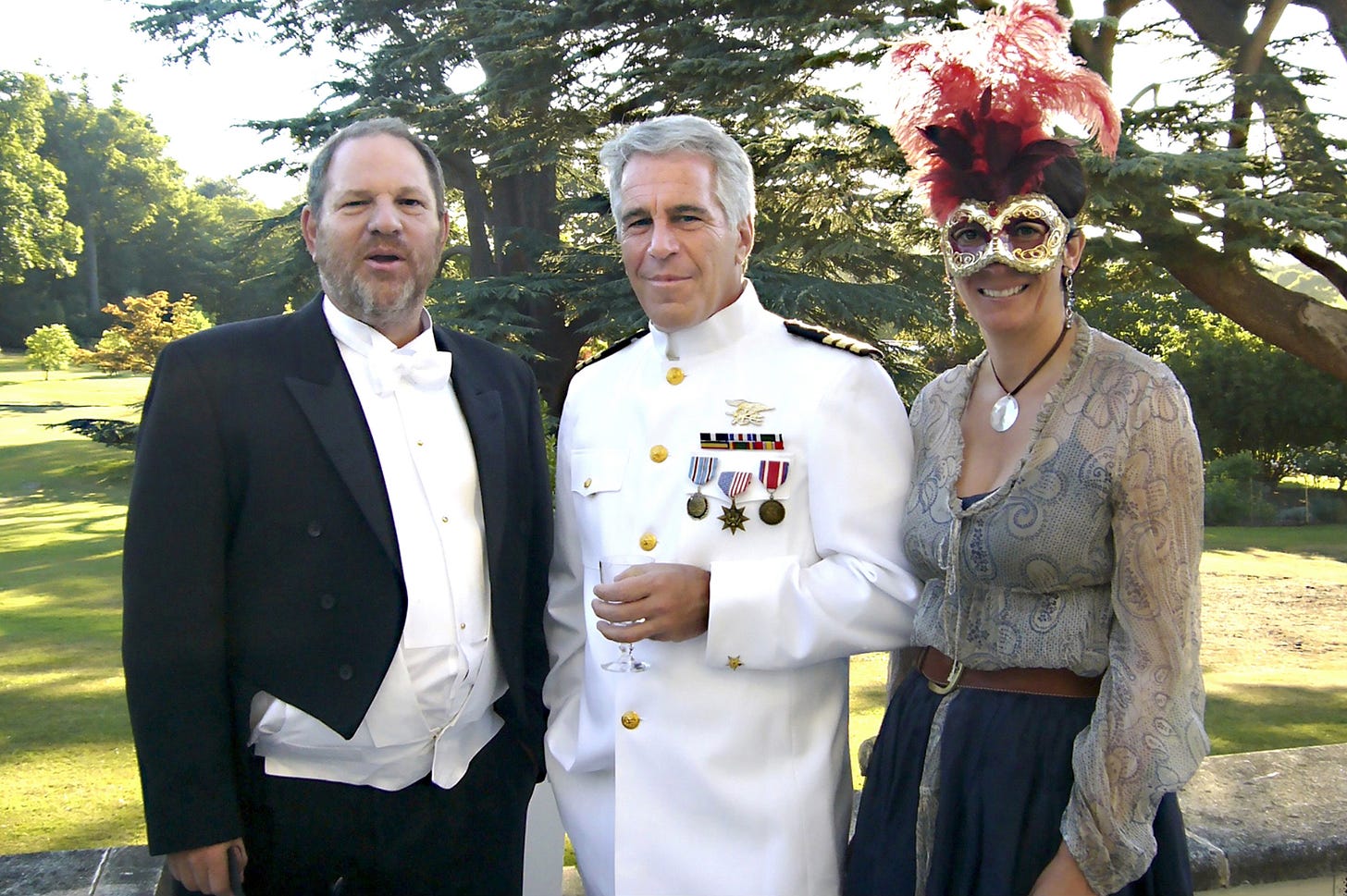How to Write Killer Prose (10)
Flat characters
Writing instruction can get over-technical. All those inciting incidents, all those three and five-act structures, all those wants and needs. It's like wiring up a circuit board. Fiction writers should note this stuff, but not be bound by it. We're not screenwriters, and we're not part of a team. We're authors, flying solo, and we can do what the hell we want.
Good stories are everywhere in real life, and they're rarely improved by forcing them to take on a standard, Hollywood shape. The supermarket and airport bookshelves (like the streamer channels) are rammed with schematic, pulpy stories, and some are OK but most, to be honest, are terrible. Clichéd characters, exposition thinly disguised as dialogue, clunky structure...
Step back. Every so often life offers us human stories of such immediacy that we (or at least I) devour them and pick over the bones obsessively. Such a story was that of Jeffrey Epstein and his chums. It's a rivetingly squalid tale, but for the fiction writer it also offers up endless lessons in human behaviour, sexual realpolitik and the application of power.
What are the key elements of the Epstein story? What can they teach us, as writers, that no how-to manual can?
At first glance Jeffrey Epstein looks like an interesting, multilayered and seriously bad character. He was certainly a skilful business person, although one who sailed very close to the wind, legally speaking. No one knows exactly how he made his fortune, but it was vast, even if he was never the billionaire he claimed. So there's mystery there. But that’s not the story, for me at least.
Epstein's friends and associates were people like Prince Andrew, Harvey Weinstein and Donald Trump, a fairly gruesome bunch, to say the least, and as we know, Epstein's principal interest was in having sex with underage girls. But while he was unquestionably repulsive, I don't find him interesting. He was a 'flat' character. He didn't develop. He made huge amounts of money in questionable ways, and thereafter simply indulged himself (even Trump had to ban Epstein from his Mar-a-Lago club for his creepy pursuit of young girls).
Ghislaine Maxwell was a similarly flat, non-developing character. The adoring daughter of the flagrantly corrupt newspaper tycoon Robert Maxwell, she found her father's corruption replicated in Epstein. She became his girlfriend, then his partner in sexual abuse and sex-trafficking. Again, repulsive but not particularly interesting.
Did Epstein or Maxwell have a meaningful cultural life? Nothing suggests so. Did they have ambivalent feelings about their behaviour? Did they feel guilt at their crimes? Again, nothing suggests so. They were characters who at first glance appear compelling in their awfulness. But get up close and it's desperately tawdry and sad. Spy-cameras in toilets, frightened teenage girls forced to debase themselves under the pair's predatory gaze, sex toys left for the cleaner to wash.
There's no texture to Epstein. He's essentially uni-dimensional. And so were his celebrity pals. A dull, entitled and morally bankrupt bunch, pretty much without exception. About his victims, we know little except that they were very young, and (at the time) wholly powerless. So where are the complex, ambiguous characters in this story? Where's the texture?
For me, the interesting people are the ones whose names crop up on the edge of the Epstein story. The people who knew what was going on, but turned a blind eye. The people who tacitly, if not actually, enabled him. The people who, deep down, knew that the presence of those very young girls at his parties could only mean one thing, but did nothing.
It clearly mattered intensely to Epstein that others, ideally others of influence, be drawn in to his creepy sex-world and compromised. Partly because that gave him power over them, partly because it appeared to validate, or at least mitigate, his own behaviour. Some of these were career predators for whom sex with a trafficked girl was, if not routine, not unremarkable. But I'm willing to bet that plenty of them weren't. There must have been men around Epstein who thought themselves decent people, principled people even, but who capitulated when faced with the glittering temptations he offered. It’s around these men, whose names we don't know, and probably never will, that the really compelling stories are located. They started in one place, but when lust, greed and ambition led them to override their better judgement, they ended up in quite another.
These are the people whose stories fascinate me. Flat characters like Epstein are spectacular in their ghastly way, but it's how they infect those around them that we should pay attention to. The way that he created a world of moral illusion, stood back, and watched as his admirers competed to corrupt themselves. That for me is the beating heart of this story, not the rank behaviour of the man himself. I imagine that being corrupted by Epstein would have been a frictionless, luxurious process. As CS Lewis wrote in The Screwtape Letters "...the road to hell is a gradual one - the gentle slope, soft underfoot, without sudden turnings, without milestones, without signposts..."
Find a good story, the sort that gets its hooks into you, and then search around its margins. Look for ambivalence, uncertainty and human weakness, not straight-up devilry. Find the unobvious story, and pull it like an eel from the mud. Get your hands dirty. Get writing.



You hit the nail on the head with this one. Really loving this series
I agree with the sentiment of this section, although after reading it I now have a lump in my throat. Makes me want to puke. History is full of people like Epstein who couldn't have risen to wealth and power without their retainers enabling them. I have difficulties writing about such morally compromised creatures. Feels like scrubbing a really filthy toilet with bare hands...